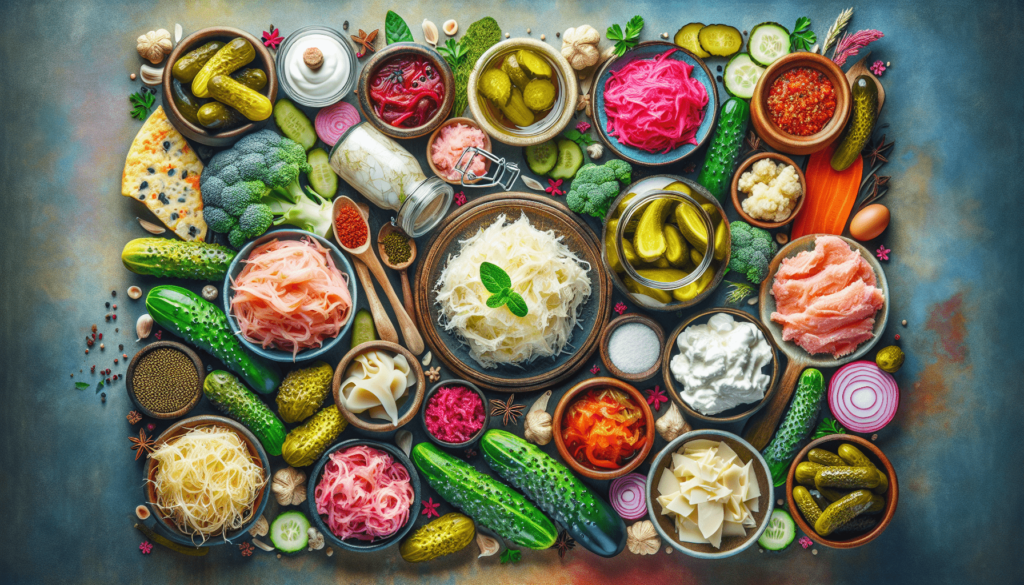Embarking on a keto journey can be transformative for your body, and when you blend it with the incredible benefits of fermented foods and probiotics, you’re setting the stage for optimal gut health and overall wellness. This insightful guide is your key to discovering how these nutrient-rich powerhouses can enhance your digestion, amplify your keto outcomes, and contribute to a more balanced gut flora. You’ll uncover delicious recipes and valuable insights that pave the way for a thriving keto lifestyle, all while nurturing your gut health. Embrace this synergy of keto and fermentation to unlock a revitalized you.

Start Your Keto Journey Today!
Unlock the Benefits of Keto Fermented Foods for Gut Health
Embarking on a journey towards better health can be an enlightening experience, especially when you learn to harness the power of keto fermented foods for optimal gut health. This combination not only aims at weight management and energy improvement but also significantly benefits your digestive system. Let’s delve into why gut health is so important, how the keto diet and fermented foods create a perfect synergy, and the enhanced experience fermented foods can bring to your keto lifestyle.
Understanding the importance of gut health
Your gut health is paramount to your overall well-being. It affects everything from your immune system to your mood, energy levels, and even your mental health. A balanced gut microbiota ensures proper digestion, nutrient absorption, and a strong defense system against pathogens. Maintaining a healthy gut is thus crucial for your physical and mental health.
The synergy between keto diet and fermented foods
The ketogenic diet, with its high-fat, moderate-protein, and low-carbohydrate approach, has proven effective for weight loss, energy maintenance, and more. When you introduce fermented foods into this diet, you add beneficial probiotics, which support a healthy gut microbiota. This synergy enhances the digestive benefits of the keto diet, making it easier for your body to process the high-fat intake and maintain a healthy, balanced gut ecosystem.
How fermented foods enhance the keto experience
Fermented foods introduce probiotics to your digestive system, improving nutrient absorption and reducing inflammation. This can significantly enhance your keto experience by improving digestion, reducing bloating, and even helping mitigate the initial adverse effects of transitioning into ketosis, such as the keto flu. The addition of these nutrient powerhouses can thus elevate your health, digestion, and overall results on a keto diet.
The Basics of Ketogenic Diet and Fermentation
To better understand how keto and fermented foods work together, let’s break down the basics of each component.
Principles of a ketogenic diet
The ketogenic diet operates on the principle of ketosis, where the body burns fat for fuel instead of carbohydrates. By significantly reducing your carb intake and replacing it with healthy fats, your body enters a state of ketosis, leading to several health benefits, including weight loss, improved brain function, and stabilized blood sugar levels.
Introduction to fermentation and its benefits
Fermentation is a process where microorganisms like bacteria and yeast convert carbs into alcohol or acids, acting as a natural preservative and creating beneficial enzymes, B vitamins, omega-3 fatty acids, and various strains of probiotics. Fermented foods are renowned for their role in improving gut health, boosting the immune system, and enhancing nutrient absorption.
Why keto and fermented foods are a perfect match
The high-fat content of a ketogenic diet can sometimes challenge the digestive system. Fermented foods introduce probiotics that help break down these fats and improve nutrient absorption, making them a perfect match. This combination can lead to a healthier gut microbiome, better digestion, and an enhanced ketogenic diet experience.
Start Your Keto Journey Today!
Identifying Keto-Friendly Fermented Foods
Incorporating fermented foods into your keto diet can be delightful and beneficial. But which ones fit the bill?
List of keto-approved fermented foods
- Sauerkraut
- Kimchi
- Pickles (unsweetened)
- Kefir (dairy or water, unsweetened)
- Yogurt (full-fat, unsweetened)
- Kombucha (low-sugar)
- Miso
- Natto
Nutritional profiles of popular keto fermented foods
These keto-friendly fermented foods are not just low in carbs but also rich in probiotics, vitamins, and minerals. For instance, sauerkraut is an excellent source of Vitamin C and digestive enzymes, while kefir is packed with several key nutrients, including calcium, protein, and B vitamins.
Incorporating diverse fermented foods into a keto diet
Diversity is key to obtaining different probiotics and nutrients, so try to include a variety of fermented foods in your diet. You can start with adding sauerkraut to your salads, enjoying a glass of kombucha, or incorporating full-fat yogurt into your smoothies. Experimenting with different fermented foods can also make your keto journey more interesting and flavorful.
The Science Behind Fermentation and Gut Health
Understanding the science behind fermentation and its impact on gut health can help you appreciate the importance of integrating fermented foods into your keto diet.
How fermentation impacts the microbiome
During fermentation, beneficial bacteria break down sugar and starches, producing lactic acid. This process not only preserves the foods but also creates environments where beneficial microbes thrive. Consuming these foods boosts the diversity and health of your gut microbiome, which is essential for a healthy digestive system.
The role of probiotics in gut health
Probiotics are live microorganisms that provide health benefits when consumed in adequate amounts. They help balance the gut microbiota, which is crucial for digestion, immune function, and even mental health. By including fermented foods in your keto diet, you’re directly supplying your gut with these beneficial probiotics.
Understanding prebiotics and their importance
Prebiotics are fibers that the human body cannot digest. They serve as food for probiotics, helping them grow and maintain a healthy gut microbiome. Some keto-friendly sources include garlic, onions, and asparagus. Combining prebiotics with probiotic-rich fermented foods can amplify the gut health benefits.

Crafting a Keto Fermented Foods Diet Plan
Creating a balanced keto diet that includes fermented foods is easier than you might think. Here’s how to get started.
Creating a balanced keto meal plan with fermented foods
When planning your meals, aim for variety. Include a source of healthy fats, moderate protein, low-carb vegetables, and at least one serving of fermented foods in each meal. For example, a serving of salmon with avocado, steamed broccoli, and a side of kimchi makes for a balanced, gut-friendly keto meal.
Tips on portion control and frequency
While fermented foods are beneficial, it’s essential to consume them in moderation due to their high sodium content and potent flavors. Start with small portions and gradually increase as your body adapts. Aim for at least one serving of fermented food per day for optimal gut health benefits.
Monitoring and adjusting your diet for optimal results
Every body is unique, so it’s important to listen to yours and adjust your diet accordingly. If you’re new to fermented foods, you might experience some bloating or intestinal discomfort initially. If these symptoms persist, try reducing the portion or frequency until your body adjusts. Always aim for a variety and balance in your keto diet to ensure you’re getting all the necessary nutrients for optimal health.
DIY Keto Fermented Foods Recipes
Creating your own keto-friendly fermented foods can be a fun and rewarding experience. Here are some simple recipes and tips to get you started.
Simple recipes to make your own keto fermented foods
Making your own sauerkraut or kimchi can be surprisingly easy. All you need is cabbage, salt, and time. By adding other low-carb vegetables like radishes or spices, you can customize the flavor to your liking. There are plenty of online resources and guides to help you through the fermentation process.
Innovative ways to incorporate fermented foods into meals
Apart from adding fermented foods as sides, you can get creative and use them as ingredients. Blend kefir into your morning smoothie, use miso paste to marinate meats, or add sauerkraut to your keto sandwiches for extra flavor and crunch.
Preservation and storage of homemade fermented foods
Proper storage is key to preserving the probiotic content of your homemade fermented foods. Store them in airtight containers, and keep them refrigerated to slow down the fermentation process. Most homemade fermented foods can last several months when stored correctly.
The Impact of Keto Fermented Foods on Digestion
Including fermented foods in your keto diet can dramatically improve your digestive health. Here’s how.
How fermented foods improve digestive health
Fermented foods introduce beneficial bacteria to your gut, aiding in digestion and nutrient absorption. They can also help break down the fibers and fats in your keto diet, making it easier for your body to process them. This can lead to reduced bloating, improved bowel movements, and an overall more comfortable digestive experience.
The effect of a high-fat diet on the gut microbiome
While a high-fat diet like keto has many benefits, it can sometimes strain your digestive system and alter your gut microbiome. Incorporating fermented foods can help balance your gut flora, ensuring your high-fat diet supports rather than hinders your gut health.
Combating common digestive issues with fermented foods
Common issues like bloating, gas, and constipation can all be mitigated by introducing more probiotics into your diet through fermented foods. The probiotics help maintain a healthy environment in your gut, which can alleviate and prevent these uncomfortable conditions.
Overcoming Challenges with Keto Fermented Foods
While integrating keto fermented foods into your diet offers numerous benefits, it’s not without its challenges. Here’s how to address them.
Addressing common misconceptions
There’s a misconception that all fermented foods are high in carbs, but many are perfectly keto-friendly. Educating yourself on which foods fit your diet and their proper portions can help you enjoy their benefits without breaking your carb limit.
How to balance flavors in keto fermented foods
Fermented foods can have strong, tangy flavors that some might find overwhelming. Balancing them with fatty and protein-rich foods can mellow out the flavors. For example, pairing kimchi with avocado or adding sauerkraut to a fatty pork dish can create a delicious and balanced meal.
Managing potential side effects
As your body adapts to more fermented foods, you might experience mild side effects like bloating or gas. Start with small portions and gradually increase your intake. Drinking plenty of water and maintaining a balanced diet can also help minimize these effects.
Success Stories: Transformations with Keto Fermented Foods
Numerous individuals have experienced significant health improvements and weight loss by incorporating keto fermented foods into their diets. Here are a few success stories that might inspire you.
Personal stories of health and weight loss
From dramatic weight loss journeys to improved digestive health and increased energy levels, the stories of individuals who have embraced the keto diet with fermented foods are both inspiring and motivating. Hearing about the positive changes in their lives can encourage you to embark on your own journey towards better health.
The role of community and support
The importance of community and support cannot be overstated. Whether it’s through online forums, local groups, or with friends and family, having a support system can provide motivation, accountability, and valuable advice. Sharing experiences and challenges can also help you learn and grow on your keto journey.
Learning from setbacks and challenges
Every journey has its ups and downs, and it’s essential to learn from them. If you encounter challenges with integrating fermented foods into your keto diet, don’t get discouraged. Instead, see them as opportunities to adjust your approach and continue striving towards your health goals.
Frequently Asked Questions about Keto and Fermented Foods
Here are answers to some common questions about combining the keto diet with fermented foods, clearing up any confusion you might have.
Addressing common questions and concerns
- Are all fermented foods keto-friendly? Not all, but many fermented foods are low in carbs and suitable for a keto diet. Check the nutritional profile to make sure.
- How much fermented food should I eat on keto? Start with small portions (a few tablespoons) and see how your body reacts. You can gradually increase your intake to one serving per day.
- Can I eat too much fermented food? While fermented foods are beneficial, too much can lead to excessive sodium intake or digestive discomfort. Listen to your body and adjust accordingly.
Myths vs. Facts: Clearing up confusion
-
Myth: Fermented foods will kick you out of ketosis.
-
Fact: Most fermented foods are low in carbohydrates and won’t affect your ketosis state when consumed in moderation.
-
Myth: You need to eat fermented foods at every meal.
-
Fact: While beneficial, you don’t need to overwhelm your diet with fermented foods. Incorporating them once daily or a few times a week is sufficient.
Expert advice on making the most of your keto fermented diet
Experts recommend integrating a variety of fermented foods into your diet to benefit from different probiotics and nutrients. They also emphasize the importance of quality and preparation methods. Choosing organic, naturally fermented products without added sugars or preservatives will maximize the health benefits of your keto fermented foods diet.
By embracing the fusion of the ketogenic diet with fermented foods, you can enjoy improved digestion, enhanced nutrient absorption, and a thriving gut microbiome. With careful planning, moderation, and experimentation, you can unlock the full potential of this powerful dietary synergy and achieve your health and wellness goals.

